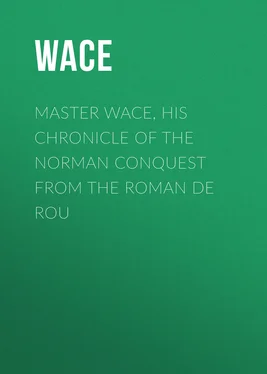Wace - Master Wace, His Chronicle of the Norman Conquest From the Roman De Rou
Здесь есть возможность читать онлайн «Wace - Master Wace, His Chronicle of the Norman Conquest From the Roman De Rou» — ознакомительный отрывок электронной книги совершенно бесплатно, а после прочтения отрывка купить полную версию. В некоторых случаях можно слушать аудио, скачать через торрент в формате fb2 и присутствует краткое содержание. Жанр: foreign_prose, История, foreign_edu, foreign_antique, на английском языке. Описание произведения, (предисловие) а так же отзывы посетителей доступны на портале библиотеки ЛибКат.
- Название:Master Wace, His Chronicle of the Norman Conquest From the Roman De Rou
- Автор:
- Жанр:
- Год:неизвестен
- ISBN:нет данных
- Рейтинг книги:4 / 5. Голосов: 1
-
Избранное:Добавить в избранное
- Отзывы:
-
Ваша оценка:
- 80
- 1
- 2
- 3
- 4
- 5
Master Wace, His Chronicle of the Norman Conquest From the Roman De Rou: краткое содержание, описание и аннотация
Предлагаем к чтению аннотацию, описание, краткое содержание или предисловие (зависит от того, что написал сам автор книги «Master Wace, His Chronicle of the Norman Conquest From the Roman De Rou»). Если вы не нашли необходимую информацию о книге — напишите в комментариях, мы постараемся отыскать её.
Master Wace, His Chronicle of the Norman Conquest From the Roman De Rou — читать онлайн ознакомительный отрывок
Ниже представлен текст книги, разбитый по страницам. Система сохранения места последней прочитанной страницы, позволяет с удобством читать онлайн бесплатно книгу «Master Wace, His Chronicle of the Norman Conquest From the Roman De Rou», без необходимости каждый раз заново искать на чём Вы остановились. Поставьте закладку, и сможете в любой момент перейти на страницу, на которой закончили чтение.
Интервал:
Закладка:
34
'Thor-aide,' according to M. Pluquet, which he considers may have been derived from the ancient North-men. Another MS. reads 'Turie:' and M. Le Prevost considers the latter to be the true reading, and that the cry was really Thury, and most probably referred to the chief seat of Raol Tesson.
35
Congnoissances u entre-sainz,
De plusors guises escuz painz.
36
The cry of Saint Sever! has been noticed in a preceding note.
37
The church of the commune called le vieux Thorigny is stated to have been dedicated to St. Amand; but see the observations in Mém. Ant. Norm . v. 221.
38
Men of the Cotentin, a district comprehended in, though not so large as, the present department of La Manche.
39
De Costentin iessi la lance,
Ki abati le rei de France.
40
Maissy, arrondissement of Bayeux.
41
Creully, Croleium, or Credolium, in the arrondissement of Caen; celebrated for its castle, and the lords of the name, who also held among others the chateau de Gratot. Mém. Ant. Norm . ii. 251. Thorigny and Creully passed with one of Robert Fitz Hamon's daughters to Robert, Earl of Gloucester, natural son of Henry I.
42
The Chronicle of Normandy says it was Guillesen, uncle of Hamon, who overthrew the king; William of Malmesbury says it was Hamon himself. There is some obscurity in the account of this assault on the king. The passage marked with brackets looks like merely another version of the incident just before related; thus incorporating perhaps the various readings of two MSS. instead of selecting one.
43
Notre dame d'Esquai is on the banks of the Orne, near Vieux. There is, however, another Esquai, a league from Bayeux.
44
The Chronicle of Normandy calls him Bardon; Dumoulin says he was nephew to Grimoult. Another MS. reads Hardré.
45
The Orne.
46
Allemagne and St. André de Fontenay, both in the arrondissement of Caen. There was an abbey of ancient foundation at the latter.
47
The Chronicle of Normandy reports the same.
48
Brionne is on the Risle. The castle here described must not be confounded with the one whose remains still exist. There is no vestige of the old castle on the island. See an article on Brionne in Mém. Ant. Norm . iv. 415. Ordericus Vitalis says the siege lasted three years.
49
Burgundy.
50
The name Salle and Saulz occurs in this district in Gallia Christiana . There is a Saulx-mesnil near Valognes, the scene of the treachery planned against William.
51
The charter of donation to Bayeux is in Gallia Christiana , and is dated 1074. Among the witnesses are Robert Fitz Hamon, son of one of the traitors, and Eudo Dupifer, one of Hubert de Rie's sons. The curious inquest of the possessions of the see of Bayeux, (taken temp. Hen. I. and printed in Mém. Ant. Norm . vol. viii.) of which the list of Bayeux knights in the Norman Roll of the Red book is only an abridgement, says, in speaking of Grimoult, 'in carcere regis apud Rothomagum mortuus est; et sepultus in cimiterio Sti. Gervasii extra villam; habens adhuc tibias in compedibus ferreis, in signum proditionis, de quâ erat ab ipso rege accusatus.' In the roll, which agrees with the inquest, is this entry, 'Feodum Grimundi de Plesseiz erat fœdum 8 mil. cum terrâ de Bougeio et de Danvou, quam Grimundus dederat Willelmo de Albinneio cum sorore sua in maritagio.' Further particulars are given in the inquest, and in the Bull of Eugenius III. 1144, also printed in Mém. Ant. Norm . viii. The word 'abbey' is probably only used here by Wace to suit his rhyme; though the Chronicle of Normandy, improving upon the error, says the abbey of Caen. Wace meant to allude to an appropriation of Grimoult's lands among the prebends; and in fact, in the Bayeux inquest, it is stated that Odo created out of them seven prebends; retaining in demesne Plessis, and the forest of Montpinçon.
52
Canute died 12th November, 1035, or four months and a half after Duke Robert; so that Wace here retraces his steps to take up English affairs.
53
Ethelred, Edward and Alfred are spelt by Wace, Ewart and Alvred.
54
Harold.
55
Barfleur. This expedition took place in 1036. Hantone is Hampton, probably Southampton.
56
This port seems to have been Wissant, between Calais and Boulogne: see William of Jumieges and the Encomium Emmæ . Alfred went by land to the Boulognese.
57
Spelt Gwine by Wace .
58
Guildford, in Surrey.
59
Hardicanute died 10th July, 1042. Edward's conduct to his mother was not consistent with any sense of obligation towards her, nor indeed with his own generally received character. See an anecdote in Roger Hoveden , 1043.
60
Or Editha. 'Sicut spina rosam genuit Godwinus Editham.' Ingulfs account of her kindness, literary tastes, and liberality, in giving him money, as well as access to the royal larder, may be seen in his chronicle, and is quoted in the collection of Norman historians by Mascres . As to her matrimonial position with her husband, Wace's words are
E ço alouent la gent, disant
Ki charnelment od li ne jut,
Ni charnelment ne la conut:
Maiz unkes hom ne l'aparçut,
Ne mal talent entrels ne fut.
61
Wace seems not aware that Editha, at the time of the disgrace of her family, was stripped of all she had, and sent to a convent.
62
Wace would appear here to be merely translating some cotemporary chronicle;—perhaps the same, as he begins this part of his story by quoting.
63
The adventure of William of Arques is out of chronological order in Wace , who, however, follows William of Jumieges.
64
Arques is the capital of the district around, formerly called Tallou, Tellau, or Tallogium.
65
The MSS. differ; we follow Duchesne's. M. Pluquet's text reads 'La tur rut fete el pié del munt.'
66
'Chasteillun,' afterwards 'Chastelet.'
67
St. Aubin-le-Cauf, on the other side of the valley. There is another St. Aubin, south of Arques.
68
Hugh Bardolf, a distinguished name in Norman and English history. In the roll of Norman fees in the red book of the Exchequer, we find Doon Bardulf returned as one of those, 'qui non venerunt nec miserunt nec aliquid dixerunt.'
69
Enguerran, count of Ponthieu, the second of the name, nephew of Guy the bishop, who afterwards wrote the latin poem on the battle of Hastings, which is now in the press at Rouen. He succeeded his father, Hugh II. in 1052; and was himself succeeded by his brother Guy, afterwards taken prisoner at the battle of Mortemer, their brother Valeran being killed there. Mr. Stapleton has, in the Archæologia , vol. 26, shown that this Enguerran married Adelidis, sister of the whole blood to the Conqueror; and that Adelidis, wife of Odo, Count of Champagne, was one of her daughters; the other being Judith, wife of Waltheof.
Читать дальшеИнтервал:
Закладка:
Похожие книги на «Master Wace, His Chronicle of the Norman Conquest From the Roman De Rou»
Представляем Вашему вниманию похожие книги на «Master Wace, His Chronicle of the Norman Conquest From the Roman De Rou» списком для выбора. Мы отобрали схожую по названию и смыслу литературу в надежде предоставить читателям больше вариантов отыскать новые, интересные, ещё непрочитанные произведения.
Обсуждение, отзывы о книге «Master Wace, His Chronicle of the Norman Conquest From the Roman De Rou» и просто собственные мнения читателей. Оставьте ваши комментарии, напишите, что Вы думаете о произведении, его смысле или главных героях. Укажите что конкретно понравилось, а что нет, и почему Вы так считаете.












